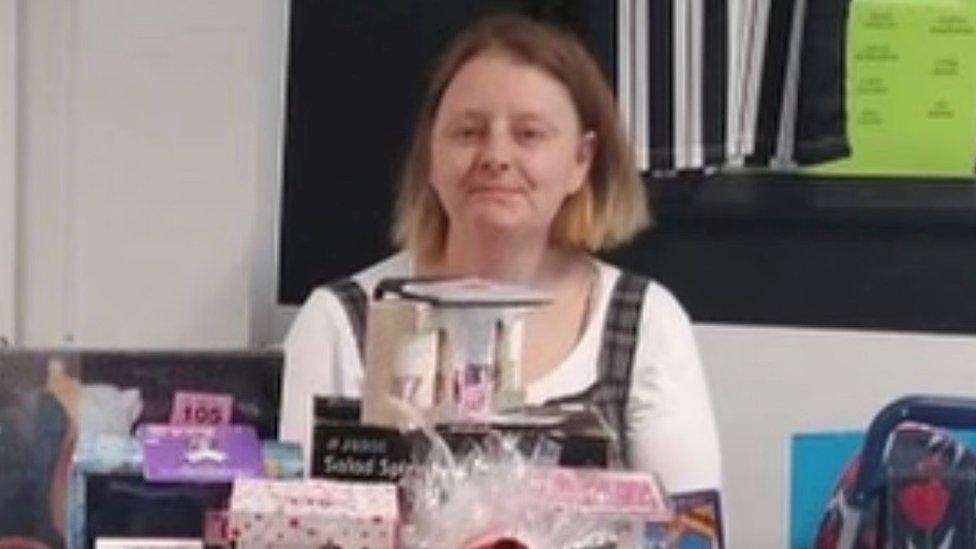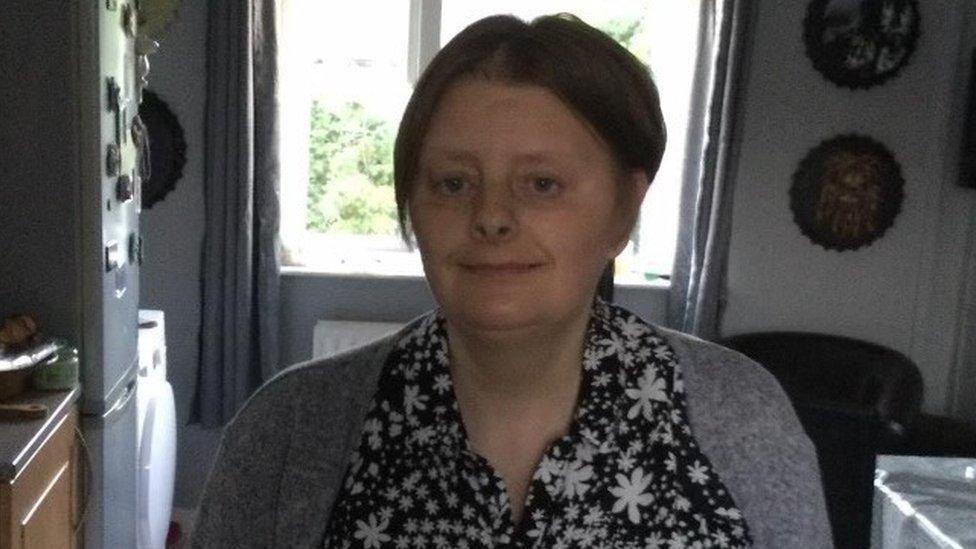Linda Banks: Ferryhill woman's care did not change despite overdoses
- Published

Linda Banks died in April 2022
Mental health staff did not escalate a woman's care, or risk status, even after two overdoses, an inquest heard.
Linda Banks died in April 2022 from a fatal overdose after weeks of contact with the Tees, Esk and Wear Valley NHS Trust, who considered her low-risk.
The 48-year-old was hospitalised twice in February but the trust's plan for her care did not change, assistant coroner Janine Richards heard.
Ms Richards is considering if failings contributed to Ms Banks's death.
The inquest previously heard that when Ms Banks, from Ferryhill in Country Durham, made contact with the trust's crisis team in February 2022, she was grieving for her mother, stressed about financial issues and struggling to end her alcohol dependency.
She was admitted to the University Hospital of North Durham on 18 February after taking an overdose, where she was given an assessment by mental health nurses, the inquest in Crook heard.
The nurses noted she had been "upset and tearful" and had "impulsively" taken an overdose of her medication at home for which she "felt instantly regretful", the coroner heard.

Linda Banks had many contacts with mental health workers
Nurses said she "remained regretful, and strongly denied any thoughts of self-harm or wanting to end her life". Consequently, her care plan focused on finding Ms Banks support for alcohol withdrawal and her benefit issues, as well as bereavement counselling.
She was not given a copy of the plan because the mental health staff were not able to use the printers in the Accident and Emergency department, which was run by a different NHS trust with a different system, the inquest heard.
Ms Banks returned to hospital eight days later after taking a larger overdose, and she appeared "confused and disorientated" as well as "paranoid and suspicious of staff" her notes said.
Ms Richards asked if that should have "set some alarm bells ringing" that she may have been in psychosis.
'Driving her distress'
Liaison nurse Christopher English told the coroner her symptoms could have been a sign of psychosis or linked to the "physical" illness for which was she was being treated in hospital.
Another assessment on 2 March found her "emotional and tearful" and expressing concern about being in trouble with hospital staff, while needing "constant reassurance and support", the coroner heard.
Ms Richards asked if that prompted Mr English to reconsider her treatment plan, to which he replied that it was "definitely taken into consideration". But once again he stated Ms Banks's behaviour could have been symptoms of the physical illness for which she was being treated.
A final assessment was carried out on 8 March by Mr English before her anticipated discharge.
He said she had "remained slightly anxious" but was "bright and reactive" and not expressing any plans or intention to harm herself.
He said her care plan had remained unchanged from the plan formulated in February because he believed that that plan had been designed to address the issues that were "driving her distress".
'Hearing voices'
Mr English said he did not feel there had been a need for further psychiatric treatment as her "anxieties were reasonable to what she was concerned about" rather than having "any delusional element".
On 29 March, Ms Banks's GP contacted the trust's access team, which offered low-level mental health treatment, asking for an urgent appointment as the patient was extremely agitated and paranoid.
Access team clinician, Lesley Hooton, said she managed to speak on the phone to Ms Banks and her brother, who said she was "anxious" and "paranoid", hearing voices and "struggling to eat, relax and sleep".
But she "had no plans to harm herself" and Ms Hooton decided Ms Banks did not meet the "threshold" required for intervention from the crisis or early intervention psychosis team.
Instead Ms Hooton arranged a visit from the access teams' outreach workers, which would typically take place in two to three weeks.
Ms Banks's brother contacted Ms Hooton again several days later to say his sister's mental health had deteriorated further, that she was not responding to him and he was having to force her to drink water.
Ms Hooton said at that point she decided the crisis team should get involved and arranged for them to assess her, closing the access team's involvement.
The inquest has heard that the crisis team, which was in special measures and suffering chronic staff shortages, assessed Ms Banks and continued to judge her at low risk of self-harm.
Days later, she took a fatal overdose.
'Tough love'
Helen Cooke, who had known Ms Banks for 37 years - since secondary school, said she contacted the trust twice to ask for help for her "best and closest friend".
She said, on the second occasion, on 6 April, when Ms Banks was "really stressed", the woman she spoke to asked her if Ms Banks was "putting it on" and if her friends and family had "tried tough love".
Ms Cooke said she sent a message to Ms Banks's brother saying tough love had been advised, to which he replied they should try it.
Three days later, after Ms Cooke raised the alarm at not being able to contact her friend, police forced entry to Ms Banks's home and found she had taken another overdose.
Ms Cooke said she "wasn't too happy" about the tough love advice but thought it should be tried, as it was provided by a medical professional, adding: "Now I just feel guilty."
The trust has disputed Ms Cooke's claim, with Emma Sutton KC suggesting she was "mistaken" or had "made it up after the event", which Ms Cooke denied.
The inquest continues.

Follow BBC Tees on Facebook, external, X (formerly Twitter), , externaland Instagram, external. Send your story ideas to northeastandcumbria@bbc.co.uk, external.
Related topics
- Published21 November 2023
